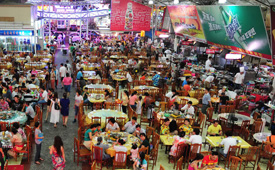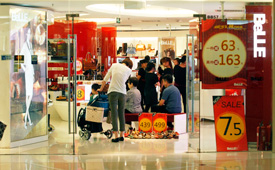|
 |
 |
|
DINNER TIME: Pictured is a sea food restaurant in Sanya, Hainan Province, on October 6 (HOU JIANSEN) |
TIME TO SHOP: Discount signs to lure customers to a shoe shop in Beijing on October 6 (CFP) |
A total of 425 million Chinese people traveled during the holiday (September 30-October 7), and per-capita travel spending was 495 yuan ($79).
October 2 was a day that Lin Chaoyue, a civil servant in Beijing, had long awaited. After having been together for seven years, he and his college sweetheart got married in his hometown of Shantou, south China's Guangdong Province. Witnessed by about 200 guests in an exquisite five-star hotel, Lin and his bride exchanged glimmering rings. During the sumptuous reception dinner, the couple made a toast to each table in glasses filled with pricey, fine wine.
"I spent 300,000 yuan ($47,700) on the wedding, including 150,000 yuan ($23,850) for catering and the wedding planning company, 50,000 yuan ($7,950) for guests' hotel rooms and plane tickets, and 100,000 yuan ($15,900) for the wedding gown and tuxedo and my wife's jewelry. The reason we chose the National Day holiday is because it's the only long vacation we have and everybody is free from work," said Lin.
Lin's spending spree didn't seem out of touch during the National Day holiday, dubbed the Golden Week (normally October 1-7). This year's holiday was one day longer, which bridged the Mid-Autumn Festival (September 30) and the Golden Week.
With countless weddings, family dinners and other rendezvous, restaurants raked in a windfall. According to the Ministry of Commerce (MOFCOM), sales revenue for the retail and catering sectors totaled 800.6 billion yuan ($127.3 billion) during the holiday, up 15 percent year on year. Sales revenue of key catering enterprises and restaurants in Shanghai, Tianjin and Qingdao in Shandong Province grew by an average of 22.1 percent.
Sales revenues of key retail enterprises in Guizhou, Liaoning and Shaanxi provinces and Tianjin Municipality grew on average by more than 20 percent year on year, according to data from MOFCOM.
Besides buying goods and filling their stomachs, some more well-off Chinese chose to travel. A total of 425 million Chinese traveled during the period, up 40.9 percent, resulting in 210.5 billion yuan ($33.47 billion) tourism income, up 44.4 percent year on year, according to the National Tourism Administration (NTA).
The country's 119 centrally monitored scenic spots received a total of 34.25 million visitors, up 20.96 percent year on year. Tourism income of those spots surged to 1.77 billion yuan ($281.4 million), up 24.96 percent year on year, according to the NTA.
This spending prowess could add vigor to the world's second largest economy, which expanded by a modest 7.6 percent in the second quarter of 2012, the lowest level since the first quarter of 2009. Holiday spending sprees highlight the potential for increased domestic consumption in China, and the government is under pressure to create a more favorable environment for consumers to dispose their cash.
Amid a sluggish global economy, 15-percent year-on-year growth in the retail and catering field during the holiday is seen as remarkable. This is attributed to the Central Government's incentive plans, like the toll-free policy, which has directly freed up income for hotels and restaurants, said Wang Jinbin, a professor at the School of Economics at Renmin University of China.
Zhang Weiguo, Director of the Economic Institute at the Shandong Academy of Social Sciences, attributed the better-than-expected tourism figures to several factors.
|
